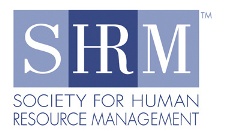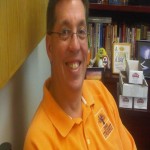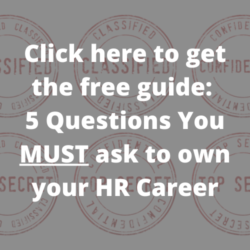 How can I get into HR? That question has been asked untold numbers of times, and the answer isn’t always an easy one. And then there’s the sticky issue of trying to figure out what’s next when you finally do get into one of those highly coveted and treasured positions in the the human resources field. :-) Let’s see if we can shed some light on those issues today, ‘kay?
How can I get into HR? That question has been asked untold numbers of times, and the answer isn’t always an easy one. And then there’s the sticky issue of trying to figure out what’s next when you finally do get into one of those highly coveted and treasured positions in the the human resources field. :-) Let’s see if we can shed some light on those issues today, ‘kay?
(Note: this is a post in the HRYP (HR Young Professional) series. If you know a young HR pro, please pass this along to them. I’d appreciate it, and so will they!)
How I got into HR
My story isn’t the one that you normally hear. So many people I’ve met and interviewed over the years ended up “falling into” the HR profession through a growing admin role or by taking a slot nobody else wanted. Not me. I’ve always been around “people” problems. My parents own a small business, and I always saw the issues they had with hiring, retaining, and compensating their employees.
I knew there had to be a way to solve those issues, so I planned to get my degree in business management. Well, luckily for me, my favorite professor from my college years assigned me a paper where I had to write about this thing called “human resources management.” In my research, I realized that this was what I’d always been looking for. I couldn’t believe there was actually an entire profession devoted to the issues I wanted to confront, and I decided then and there that HR was the career for me.
Once I graduated, I had to stay at my employer for a year since they helped to pay for my final semester of college. I was itching to find an HR role, and I was worried I’d forget everything I learned in college. So in January of 2009, I took and passed the PHR exam. When my year of indentured servitude was up with my employer (around February 2009), I started combing the career sites out there looking for an entry level HR gig. I found one with a local nonprofit organization, applied, and took on my first role in an HR capacity in April of 2009.
Trying to break in? Learn how to get into human resources without experience.
What’s next (HR career path)
I’ve spent a lot of time writing posts and recording videos to address this specific issue of advancing beyond the entry level human resources role. While I haven’t made it too far along myself, I have asked a lot of people for their thoughts and opinions, and you’ll find those below. First, here’s what I have to say on the issue:
- Rules for new HR professionals
- How to move up in HR
- Ways entry level HR pros can be more relevant
- Lessons from one year in my HR career
Thoughts from people who’ve been there, done that, and got the t-shirt
 I didn\’t choose HR – initially. I was leaving the military and interviewing with a paper manufacturer for a supply management position. After the interviews, the team asked me if I had ever considered Human Resources. At the time, and it was not that long ago, my perception of HR was a very administrative (and boring) department that processed pay actions.
I didn\’t choose HR – initially. I was leaving the military and interviewing with a paper manufacturer for a supply management position. After the interviews, the team asked me if I had ever considered Human Resources. At the time, and it was not that long ago, my perception of HR was a very administrative (and boring) department that processed pay actions.
HR was definitely not the field for me. They offered me the opportunity to spend some time with an HR department at one of the paper mills to see it in action. Sure, there was some processing of personnel actions and benefits work being done, but there were also employee relations, labor relations, staff development, recruitment and coaching actions going on. It was a pretty dynamic department.
I took the job and haven\’t looked back since. I am the Human Resource Director for a medical center of over 1400 employees and no, this was not my intention from the beginning – I grew into the position starting with the paper manufacturer, moving to an HR Department of 1 (eventually growing to 3!) for a privately held manufacturing company and then to my current position.
Lisa Rosendahl-blog–@lisarosendahl
 I always knew I wanted to work in Business Administration but was unfamiliar with HR when I entered college. It wasn\’t until my senior year of college that I settled on HR and joined the student chapter of NASHRM. My interested was piqued during a project that involved splitting our HR class into the Union and Management sides and trying to settle a labor dispute.
I always knew I wanted to work in Business Administration but was unfamiliar with HR when I entered college. It wasn\’t until my senior year of college that I settled on HR and joined the student chapter of NASHRM. My interested was piqued during a project that involved splitting our HR class into the Union and Management sides and trying to settle a labor dispute.
Once I learned about strikes, laws, and negotiations I was hooked. Only later did I figure out that HR is more than that. I really thought I would be arguing for a living and briefly considered a legal profession but this is where I ended up. I have reached the HR Director level but it was not my goal, nor is it to become a VP. I just want to be able to do my job well. The higher up you go the more stress you entail and I\’ve decided I just don\’t want that stress. I\’d also like to change and focus more on training and development or look into other positions in the company – Operations for example.
Stephanie Walsh-LinkedIn–@salawren
 I, like many in my generation, fell into HR by accident. I took a year off between my sophomore and junior years of college to work in a non-profit publishing organization – in the magazine editorial division. I thought my career path was going to be the writing/editing side of the publishing business and thought this entry level “Manuscript Typist†role would be my foot in the door. I fully intended to finish my degree at night and start moving into the publishing world at that time. You can\’t believe how boring the job was. I typed handwritten manuscripts (this was 32 years ago: pre-wordprocessing!) so that the editors could edit them. I was part of a pool of women. I was 19, the others were various ages from 23 to 65, all female.
I, like many in my generation, fell into HR by accident. I took a year off between my sophomore and junior years of college to work in a non-profit publishing organization – in the magazine editorial division. I thought my career path was going to be the writing/editing side of the publishing business and thought this entry level “Manuscript Typist†role would be my foot in the door. I fully intended to finish my degree at night and start moving into the publishing world at that time. You can\’t believe how boring the job was. I typed handwritten manuscripts (this was 32 years ago: pre-wordprocessing!) so that the editors could edit them. I was part of a pool of women. I was 19, the others were various ages from 23 to 65, all female.
I quickly determined that my plan had several flaws. But I had committed myself to this path and I was going to see it through. But to say the work was boring missed the truth of it by a mile. I\’d have all my work finished by 11:00 or so and then I\’d go hunting for something to do. I suggested to the supervisor that I be trained so that I could back up others in the department when they went on vacation and we made that happen. So, after about 3 weeks on the job, I essentially started to rotate through every other administrative and entry level professional job in the department. Within 6 months, I could and had done every job – and had done it well – that wasn\’t a supervisory job or an editing job. I figured quickly that to go back to college and finish my degree ASAP was perhaps the better plan, and I returned to school in the spring.
Fast forward another year and a half and the “personnel department†of that organization hunted me down to see if I would join them upon my graduation. I had established myself as a hardworking, team oriented producer. And so, without another offer, I accepted. My thought was that by working in personnel I\’d learn about organizations and their jobs and be able to decide on my direction. Turned out I really enjoyed the HR work. I headed up a robust summer intern program, backfilled for the recruiters, and generally made myself indispensible.
After almost 3 years I applied for a vacant recruiter position. I was 24. I had basically done the job already. But my manager told me that the hiring managers in the rest of the organization saw me as an administrative employee, not a professional employee, and that if I really wanted to progress in HR I should join another organization in a professional position and then come back once I had established myself. Tough advice. Unfair advice. Totally true advice. So I did. I was gone in 4 months. But I never went back – and I never went back to HR as a practitioner. I went to the consulting world and began a career of running consulting/service businesses in the HR space.
China Gorman-blog–@chinagorman
 “Hi, I\’m Steve and I\’m in HR…” “Hi, Steve!” (slight groan)â€
“Hi, I\’m Steve and I\’m in HR…” “Hi, Steve!” (slight groan)â€
Too often HR people sound like they\’re in a 12-step program when they state that they are in Human Resources. That should be discouraging, but I find it to be a great driver!
You see, I\’m one of those rarities in HR. I chose to be in HR intentionally and it has been the only field I\’ve ever been in! I didn\’t fall into it at all. Actually, HR found me.
When I was going to college (the fabulous Ohio University) in the early 80\’s, there wasn\’t a Human Resources program. In fact, the only class you could take was on Labor Relations. I was struggling trying to fit in as an Engineer and then a Chemist when I first started. One day on break at home I was talking to my parents and they made me see that I had a huge blind spot! My mom said, “Steve, do you notice that you\’re always around people? You tend to do things with people all the time and you tend to also gather people together. Is there a major that focuses on people that you could go into?†I ended up in Interpersonal Communications and things took off!
My first gig was for a Fortune 100 company where I was an in-house recruiter for a group of client groups throughout the corporate offices. I loved placing folks in jobs and thought that I was heading down the right path. That\’s when the issue of Company Culture smacked me right between the eyes! You see, you\’re only allowed to do certain tasks in a large company. Things are very compartmentalized. I wanted to be more of a generalist, but that wasn\’t allowed. Also, they wanted me to go into Manufacturing and I wanted nothing to do with that. I was young and naïve, so I left to pursue the world of an HR Generalist with very little experience.
Irony now steps in… My next 10 years of HR were in Manufacturing and they were phenomenal years! I got to practice HR from a grass roots level with people who were VERY human. I realized that I needed to be in a culture where I could affect other\’s lives and they could affect mine. I learned the value of practicing HR and being consistent with employees. I spent much more time with the employees than I did with Management or my desk. I was encouraged to do so and I have only benefited from that.
After manufacturing, I entered the world of consulting engineering and architecture as an HR Manager. During this time of my career, I began to develop and realize the power of networking within the greater HR community. I held a “semi-senior†role in the company and they encouraged me to get connected to the industry. At that time I became our local SHRM chapter President, began facilitating our monthly HR Roundtable (which I\’ve been at for 12 years now), started developing and giving presentations to State Conferences and local chapters/businesses, joined the State Conference Committee and started the HR Net (an internet message board for HR professionals that goes out to over 5,700 folks worldwide each week). Note from Ben: if you’re interested in the HR Net, leave a comment below and I’ll make sure Steve gets you the free signup info.
I began to realize that I was a businessperson who practiced HR and changed my focus on how HR should be practiced. I began my career with the basics of recruiting, compliance and administration like most HR people. Now I was at a place where I wanted to be a Senior Executive of a company to influence the direction and strategy of HR in order for the business to be successful. I actually grew out of my role at the consulting firm. I never thought that would ever happen in my career.
And now, I\’m the Executive Director of HR for a regional pizzeria company that is a Cincinnati tradition. All of the experiences I have gathered along the way have made me a more well-rounded human and I am more excited about being in HR now than when I started.
The great thing about our profession is that is does evolve. As long as there are humans at work, there will always be HR. It won\’t look the same as it does even today and that is fantastic! We have a chance to define the future of workplaces, the direction of employee development and leverage the power of Social Media to provide great opportunities for people of any industry.
So… I\’m Steve and I LOVE being in HR! It rocks and I wouldn\’t trade it for any profession in the world!
Steve Browne-another guest post by Steve–@sbrownehr
 Don’t fall into repetitive roles. The whole issue of HR having undefined job titles make it tough, so make sure you’re getting the experiences you want/need instead of reaching for a specific title. Each and every experience helps in the long road upward, so make sure you’re doing things that help you to grow and develop instead of doing the same thing over and over again. Take opportunities to boost your experience level even if it only makes up a small portion of the overall job you’re doing.
Don’t fall into repetitive roles. The whole issue of HR having undefined job titles make it tough, so make sure you’re getting the experiences you want/need instead of reaching for a specific title. Each and every experience helps in the long road upward, so make sure you’re doing things that help you to grow and develop instead of doing the same thing over and over again. Take opportunities to boost your experience level even if it only makes up a small portion of the overall job you’re doing.
Allen Robinson-blog–@logicwriter
 How did I end up in Human Resources? Was it a planned career choice? The short answer is no. It does remind me of a story. I was attending a SHRM Leadership Conference a number of years ago. The speaker said that they talked to a lot of kids in school and had yet to hear any child say, “When I grow up, I want to be a compensation and benefits manger for a Fortune 500 Company.”
How did I end up in Human Resources? Was it a planned career choice? The short answer is no. It does remind me of a story. I was attending a SHRM Leadership Conference a number of years ago. The speaker said that they talked to a lot of kids in school and had yet to hear any child say, “When I grow up, I want to be a compensation and benefits manger for a Fortune 500 Company.”
Now having said that, when I got into HR/Personnel (1990) I do not honestly think there was the professionalism that there is in the field today. Fortunately, I think this is changing. I have had the opportunity to talk to numerous college classes and I am happy to report that I do hear many students say they want to work in Human Resources. That is heartening. It tells me the work has become viewed with a higher degree of professionalism and is revered and respected by some, if not all, CEOs.
While I do hold the title of “director,” this was not necessarily where I was headed some 20 years ago when I got into this work. The company I work for has grown over the years and fortunately I been able to grow with them. I like to think that my growth has contributed to the overall growth of the company.
Young HR pros should immerse themselves in their work, their field and the people that they meet. Do not fear failure. Failure is a natural part of growth and development. Network with as many people as possible, if not for your career; do it as a way to develop your personal and professional network. Important friendships and relationship can be developed and nurtured in many different ways. For example, it might seem unlike that young man who works in HR in Alabama (Note from Ben: he’s talking about me, folks :-)) could have a friend and HR colleague who is twice his age located 600 miles away in Central Illinois. How do relationships like this occur? It is not by happenstance. An HR pro works hard to meet people, make new friends, and grow their personal network, which in turn will give them a wealth of resources and experience which will be available to them when needed.
Be happy, enjoy and revel in your work. If you can’t or don’t, then do something else. Do something which will provide you happiness and enjoyment.
Dave Ryan-LinkedIn–@davethehrczar
Do you have something to add? How did you start your own career in HR? Maybe you didn’t even start in HR at all, and you eventually found yourself in a role that was? I’d love to hear about your own story of career growth and advancement. If you’re looking for your first role in the HR field, I’d love to hear from you as well on what you need to succeed.

Leave a Reply
You must be logged in to post a comment.